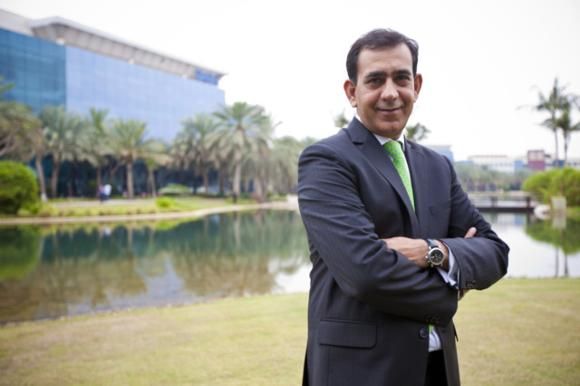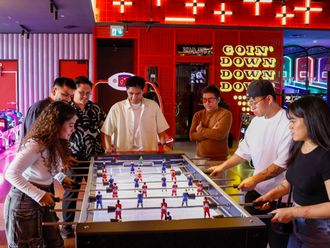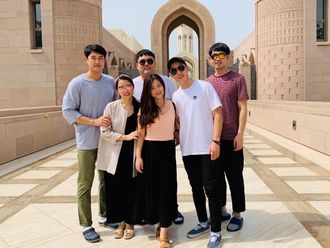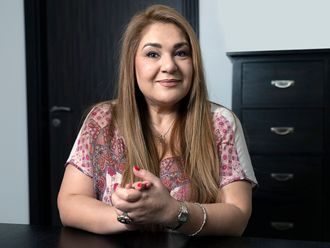
One of the most valuable lessons Raghu Malhotra learnt early in life was not to take anything for granted. “I was taught that when I was in high school in Delhi,’’ says MasterCard Worldwide’s division president for Middle East and North Africa. An above-average student, he was sure he would sail through his board exams so he took it easy in the school final year, diverting his attention to extracurricular activities.
“I had opted for the commerce stream and was confident – maybe overconfident – that I would do well,” he says. “But when the results came I was shocked. My marks were horrible. That day I realised there is no alternative to staying focused and working hard for success.’’
Raghu, 43, says it was a humbling experience but it helped him. “It meant I worked hard in college and landed a summer training job at Citibank after my graduation.’’
From there he swiftly climbed the corporate ladder but he has never allowed his career to overwhelm his life. A firm believer in working hard and playing hard, Raghu says he enjoys the simple pleasures of life such as golf, spending time with his family – wife Banali, and daughters Taanvi, 13, and Myra, five – and playing with his spaniel Odie. He tells us how he maintains a work-life balance:
I think occasional disappointments are necessary in life as they humble you. After my bad grades in my 12th grade exams I focussed.
I chose banking after working for Citibank one summer. I was in the sales and marketing division and it gave me the confidence to believe I could make my mark in the corporate world.
I realised that if you work hard you can reap success. It may sound simple, but once you are confident of your abilities you can make a mark in life. After my stint there, I was looking for a job when Citibank called asking if I would like a job in sales there. Of course I grabbed it and I learnt a lot during my time there.
After a few years, I spotted an opening at American Express and joined them in 1995. Soon after I married my school sweetheart, Banali.
I was eager to continue my studies and earn a masters degree, sure that it would help me in my career. And once I set my mind on something, I go at it with a passion. So I resigned from my job and enrolled for an MBA at the Melbourne Business School – a top international business school in Australia.
I had some savings, which I was sure would help see me and my family through the two years I would be studying. I’ve always believed it’s important to follow your gut instinct rather than to live with the regret that you did not take a chance that could have changed your life.
On hindsight, taking an MBA was a good thing. Apart from the experience of living and studying in a different country, within a week of getting my MBA in 1997, I had offers from three global multinational corporations. I chose ANZ Grindlays, who appointed me as area head for six countries in South Asia based out of Chennai in India. This was a memorable experience because I was just a young kid and had many team members in my department who were much older than me.
But I managed them well, giving them their due respect for their experience but pushing them to perform better by encouraging, motivating and leading by example.
One of my management mantras is if a decision needs to be taken, take it. Do not delay or dilly-dally. The decision may be right or wrong but the important thing is to take one. A weak point of many managers is that they waste a lot of time simply by delaying taking decisions, which could cost the company dearly.
I also have the ability to see the positive side of issues and make them work for me and for the company. I believe that if you keep looking for negatives, you will see only them. But if you look for the positives, you are sure to find them. There’s a lot to be said in being spontaneous – whether taking a decision at the workplace or at home we need to live in the moment.
In 2000, I was headhunted by MasterCard and have been with them since. At the end of 2005 I got an offer to head the operations and technology division of South Asia. However, I could not meet the concerned person to take charge until nearly three weeks later when I accidentally bumped into him at a hotel. Over a cup of coffee, he revised plans and asked me to be the director of South Asia! And from there I’ve moved up to be division president of Mena.
My parents, Sneh and Col BR Malhotra, gave my younger brother Vikram and me a well-rounded upbringing and sound values. I think inculcating in children a set of good values is more crucial than the academic education they receive. As my father was an army man who was frequently posted to different areas in India, we moved schools and homes regularly.
I learnt early in life that you cannot spend a lot of time moping or missing something for long. You have to learn to find new good friends soon and settle down as quickly as you can into a new school and atmosphere.
Our parents insisted on good education but they also ensured we played sports such as squash and tennis at school. The regular transfers sharpened our social skills so today I am able to make new friends and adapt to any environment easily.
One of the major influences in my life was my father. He sustained serious bullet injuries to his shin during his army career and was bedridden for almost a year. Doctors were not sure he would ever walk again but one day he just got up and using a food trolley as a walker, began practising to walk again. Such was his positivity. He greatly inspired me to be stoic about my own wounds – mental and physical.
I was a skilled showjumper and once, when I was in school, I had a terrible accident where I broke my arm after falling off my horse. Although in pain, I remembered my father’s words about being brave and strong whatever the situation so I got up and walked to the school clinic. To this day my arm is not straight.
One of the memories I have of my younger days is visiting hill stations while on holidays in our car. I got plenty of opportunities to get a taste of the real countryside during these trips. I recall travelling to Dibrugarh in Assam, Siliguri in West Bengal, Delhi, Haryana, Punjab and Himachal Pradesh in our Austin 1300 cc automobile.
As a family we love going on beach holidays and I have tried deep-sea diving. My wife and I are adventurous about trying new cuisines.
I love playing golf and I feel it is pretty much like meditation where you are in competition with yourself and those hours on the greens are a great de-stressor. I have made some of my best friends on the golf course. I am not into improving my handicap – what is important to me is playing the game and bonding with the golfers.
We carry so much emotional baggage – fears, opinions about people or incidents that don’t really matter – that sometimes we can get weighed down by it all. I don’t believe in brooding over the past. I wouldn’t want it to prevent me from enjoying the now.
On the personal side what I really want to leave behind as a legacy to my daughters is the values that I imbibed from my parents.
My wife, who is an achiever and professional banker, has always been hugely supportive of my career. Although we worked for competing organisations we never let that interfere in our domestic domain. We think of ourselves as a working couple with two successful careers. I am equally responsible for the girls – there are no stereotyped roles in the household, we double as parents rather than mom or dad when the other travels. I pitch in with groceries and furnishing as much as my wife does in taking decisions on investment and property.
I want my daughters Taanvi and Myra to be independent, self-sufficient and good, responsible human beings, with an understanding of the real world. I want them to spend their summers in Delhi learning the ways of the world, gaining good exposure and especially for my younger one to pick up Hindi as she only converses in English. I want them to be well-rounded individuals with a feel for the real world.
I also feel I have been singularly blessed in life with good things and want to plan giving back to society soon in a personal capacity. I am still in the process of thinking this out thoroughly before I embark on this journey to give back.












